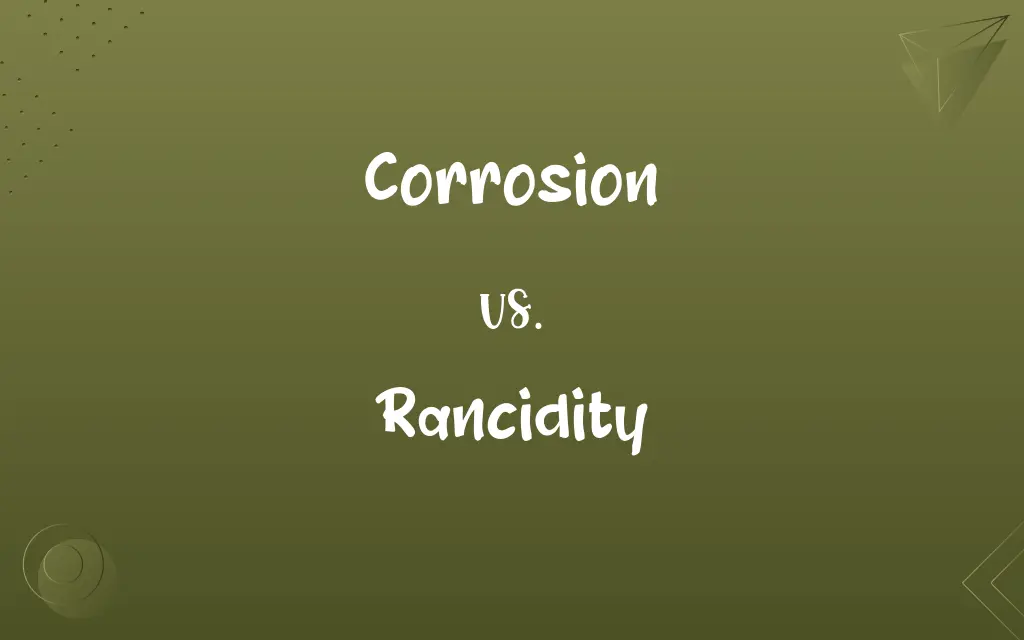Corrosion vs. Rancidity: Know the Difference

By Shumaila Saeed || Published on February 15, 2024
Corrosion is the degradation of metals due to chemical reactions, often with oxygen, while rancidity refers to the spoilage of fats and oils through oxidation or hydrolysis.

Key Differences
Corrosion primarily affects metals, leading to their deterioration through reactions with environmental elements like oxygen and water. Rancidity, in contrast, occurs in fats and oils, resulting in unpleasant flavors and odors due to oxidation or hydrolysis.
Shumaila Saeed
Feb 15, 2024
The cause of corrosion is often the exposure of metals to oxygen and moisture, initiating electrochemical reactions. Rancidity is triggered by exposure of fats and oils to light, heat, or metal ions, which accelerates the breakdown process.
Shumaila Saeed
Feb 15, 2024
Preventing corrosion involves coatings, inhibitors, or environmental controls. Rancidity prevention focuses on reducing exposure to light, heat, and air, often through refrigeration or antioxidants.
Shumaila Saeed
Feb 15, 2024
Corrosion can compromise the structural integrity of materials, leading to failures in infrastructure and machinery. Rancidity affects the quality and safety of food products, impacting their taste, aroma, and nutritional value.
Shumaila Saeed
Feb 15, 2024
Corrosion is identified by physical changes like rust or pitting on metal surfaces. Rancidity is detected through sensory changes in food, such as off-flavors and odors.
Shumaila Saeed
Feb 15, 2024
ADVERTISEMENT
Comparison Chart
Primary Causes
Chemical reactions with oxygen and moisture
Oxidation or hydrolysis
Shumaila Saeed
Feb 15, 2024
Prevention Methods
Coatings, inhibitors, environmental controls
Refrigeration, antioxidants
Shumaila Saeed
Feb 15, 2024
ADVERTISEMENT
Corrosion and Rancidity Definitions
Corrosion
A process where metals deteriorate due to oxidation.
The old car's undercarriage was plagued with corrosion from years of neglect.
Shumaila Saeed
Jan 19, 2024
Rancidity
The chemical decomposition of fats, oils, and other lipids, leading to off-flavors and odors.
The butter developed rancidity, making it unsuitable for baking.
Shumaila Saeed
Jan 19, 2024
Corrosion
The gradual destruction of materials, usually metals, by chemical reactions with their environment.
The bridge's steel beams showed signs of corrosion after years of exposure to salty sea air.
Shumaila Saeed
Jan 19, 2024
Rancidity
Deterioration of edible products as a result of oxidation.
Rancidity in nuts can be prevented by storing them in airtight containers.
Shumaila Saeed
Jan 19, 2024
Corrosion
A natural process that converts refined metal into a more chemically stable form.
The statue's bronze surface underwent corrosion, giving it a green patina.
Shumaila Saeed
Jan 19, 2024
ADVERTISEMENT
Rancidity
A process leading to unpleasant taste and odor in foods containing fats and oils.
The chips tasted stale due to rancidity from improper storage.
Shumaila Saeed
Jan 19, 2024
Corrosion
Electrochemical oxidation of metals in reaction with an oxidant such as oxygen.
Corrosion of the iron gate was accelerated by the rainy, humid climate.
Shumaila Saeed
Jan 19, 2024
Rancidity
Change in quality of fats and oils due to exposure to air, light, or moisture.
The rancidity in the salad dressing was caused by prolonged exposure to sunlight.
Shumaila Saeed
Jan 19, 2024
Corrosion
The weakening of metal caused by chemical reactions.
Corrosion on the pipes resulted in leaks and water damage.
Shumaila Saeed
Jan 19, 2024
Rancidity
Spoilage of food due to the breakdown of fats.
The rancidity of the cooking oil was evident from its unpleasant smell.
Shumaila Saeed
Jan 19, 2024
Rancidity
Having the disagreeable odor or taste of decomposing oils or fats; rank.
Shumaila Saeed
Jan 17, 2024
Rancidity
The quality or state of being rancid; a rancid scent or flavor, as of old oil.
Shumaila Saeed
Jan 17, 2024
Corrosion
(by extension) The gradual destruction or undermining of something.
Shumaila Saeed
Jan 17, 2024
Corrosion
The action or effect of corrosive agents, or the process of corrosive change; as, the rusting of iron is a variety of corrosion.
Corrosion is a particular species of dissolution of bodies, either by an acid or a saline menstruum.
Shumaila Saeed
Jan 17, 2024
Corrosion
A state of deterioration in metals caused by oxidation or chemical action
Shumaila Saeed
Jan 17, 2024
Repeatedly Asked Queries
What is Corrosion?
Corrosion is the chemical deterioration of metals due to reactions with environmental elements.
Shumaila Saeed
Feb 15, 2024
What causes Corrosion?
Corrosion is caused by chemical reactions, often between a metal and oxygen.
Shumaila Saeed
Feb 15, 2024
What triggers Rancidity?
Rancidity is triggered by oxidation or hydrolysis due to exposure to light, heat, or air.
Shumaila Saeed
Feb 15, 2024
What is Rancidity?
Rancidity is the spoilage of fats and oils resulting in unpleasant tastes and odors.
Shumaila Saeed
Feb 15, 2024
How is Rancidity prevented?
Rancidity can be prevented by reducing exposure to air, light, and heat, and using antioxidants.
Shumaila Saeed
Feb 15, 2024
Can Corrosion affect non-metal materials?
While corrosion primarily affects metals, similar processes can occur in non-metals under certain conditions.
Shumaila Saeed
Feb 15, 2024
Are all metals prone to Corrosion?
Most metals are prone to corrosion, but some, like gold and platinum, are more resistant.
Shumaila Saeed
Feb 15, 2024
Can freezing prevent Rancidity?
Freezing can slow down the rancidity process by reducing chemical reaction rates.
Shumaila Saeed
Feb 15, 2024
How can Corrosion be prevented?
Corrosion can be prevented through protective coatings, corrosion inhibitors, and controlling the environment.
Shumaila Saeed
Feb 15, 2024
Does Corrosion occur in dry environments?
Corrosion can occur in dry environments, especially if specific corrosive agents are present.
Shumaila Saeed
Feb 15, 2024
What are the signs of Corrosion?
Signs of corrosion include rust, pitting, and metal weakening.
Shumaila Saeed
Feb 15, 2024
How is Rancidity detected?
Rancidity is detected through changes in taste, smell, and appearance of fats and oils.
Shumaila Saeed
Feb 15, 2024
Is Rancidity harmful to health?
Consuming rancid fats and oils can be harmful and should be avoided.
Shumaila Saeed
Feb 15, 2024
Is Corrosion always a slow process?
Corrosion can be a slow process, but certain conditions can accelerate it.
Shumaila Saeed
Feb 15, 2024
Can Rancidity occur in all types of fats and oils?
Rancidity can occur in nearly all types of fats and oils, especially if improperly stored.
Shumaila Saeed
Feb 15, 2024
Are antioxidants effective in all types of Rancidity?
Antioxidants are effective in preventing oxidative rancidity but less so with hydrolytic rancidity.
Shumaila Saeed
Feb 15, 2024
What industries are most affected by Corrosion?
Industries like construction, automotive, and maritime are significantly affected by corrosion.
Shumaila Saeed
Feb 15, 2024
What types of food are most susceptible to Rancidity?
Foods high in fats and oils, like nuts and cooking oils, are most susceptible to rancidity.
Shumaila Saeed
Feb 15, 2024
Does all Rancidity produce a bad smell?
Most rancidity produces an unpleasant smell, but some forms may be less noticeable.
Shumaila Saeed
Feb 15, 2024
Can Corrosion be reversed?
Once corrosion occurs, it can't be reversed, but further damage can be prevented.
Shumaila Saeed
Feb 15, 2024
Share this page
Link for your blog / website
HTML
Link to share via messenger
About Author
Written by
Shumaila SaeedShumaila Saeed, an expert content creator with 6 years of experience, specializes in distilling complex topics into easily digestible comparisons, shining a light on the nuances that both inform and educate readers with clarity and accuracy.








































































